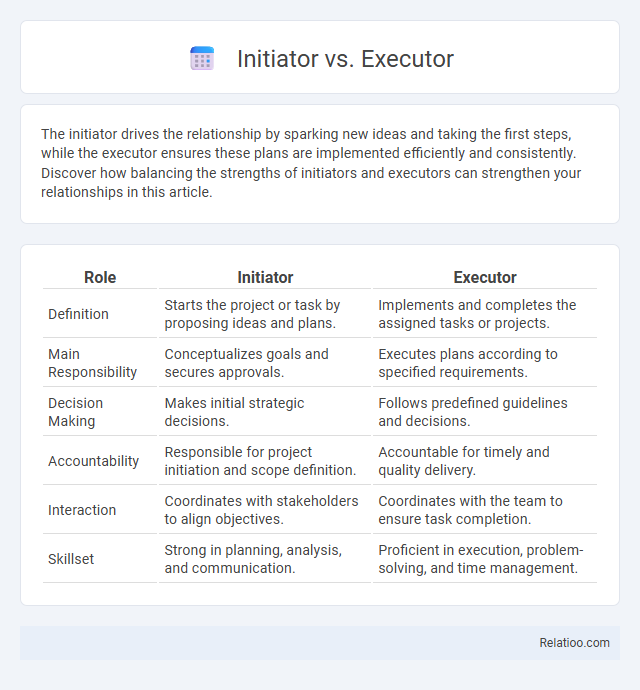The initiator drives the relationship by sparking new ideas and taking the first steps, while the executor ensures these plans are implemented efficiently and consistently. Discover how balancing the strengths of initiators and executors can strengthen your relationships in this article.
Table of Comparison
| Role | Initiator | Executor |
|---|---|---|
| Definition | Starts the project or task by proposing ideas and plans. | Implements and completes the assigned tasks or projects. |
| Main Responsibility | Conceptualizes goals and secures approvals. | Executes plans according to specified requirements. |
| Decision Making | Makes initial strategic decisions. | Follows predefined guidelines and decisions. |
| Accountability | Responsible for project initiation and scope definition. | Accountable for timely and quality delivery. |
| Interaction | Coordinates with stakeholders to align objectives. | Coordinates with the team to ensure task completion. |
| Skillset | Strong in planning, analysis, and communication. | Proficient in execution, problem-solving, and time management. |
Understanding the Roles: Initiator vs Executor
The Initiator triggers the start of a process or project by defining objectives and mobilizing resources, while the Executor is responsible for carrying out the tasks and ensuring completion according to plan. Your understanding of these roles helps in assigning responsibilities clearly, avoiding overlap, and improving workflow efficiency. Clarifying the difference between Initiator and Executor ensures accountability and streamlined project management.
Key Characteristics of an Initiator
An Initiator is characterized by their ability to identify opportunities, conceptualize ideas, and motivate teams to take the first step toward a goal. They possess strong vision, creativity, and leadership skills, driving innovation and setting the project's direction. Your success depends on understanding that unlike Executors, who focus on implementation, Initiators are pivotal in sparking action and shaping overall strategy.
Defining Traits of an Executor
The executor is characterized by a strong focus on task completion, reliability, and practical decision-making, ensuring plans are effectively implemented. Unlike initiators who generate ideas and initiate projects, executors excel in managing details, maintaining consistency, and driving progress through disciplined execution. Their defining traits include accountability, time management skills, and the ability to translate strategies into actionable steps.
Core Differences Between Initiator and Executor
The core difference between an initiator and an executor lies in their roles within a process or project; the initiator conceptualizes and starts the task, while the executor is responsible for implementing and completing it. You rely on the initiator to provide the strategic vision or impetus for action, whereas the executor ensures that the necessary steps are taken to achieve the desired outcomes. Understanding these functions clarifies accountability and efficiency across project management and operational workflows.
Strengths and Challenges of Each Role
The Initiator excels at generating innovative ideas and setting project direction, but may face challenges with follow-through and detailed execution. The Executor thrives in implementing plans efficiently and managing resources, often struggling with adaptability to changing circumstances or initial concept development. Your team benefits most when these roles collaborate, balancing creative vision with practical action to overcome individual limitations.
How Initiators and Executors Drive Project Success
Initiators define project goals, secure resources, and align stakeholder expectations, setting a clear vision essential for project success. Executors implement project plans by managing tasks, timelines, and team coordination, ensuring that objectives are achieved efficiently. Collaborative communication between Initiators and Executors improves decision-making, mitigates risks, and drives the project to successful completion.
When to Leverage Initiators Versus Executors
When deciding between initiators and executors, consider leveraging initiators for tasks that require idea generation, strategic planning, or setting the direction of a project. Executors excel in implementing plans, managing detailed workflows, and ensuring timely completion of tasks according to predefined goals. Understanding your project's needs helps you determine when to prioritize creative input from initiators or focused execution by executors to maximize efficiency and effectiveness.
Building Effective Teams: Balancing Both Roles
Balancing the roles of Initiator and Executor is essential for building effective teams, as Initiators spark innovative ideas and set strategic directions while Executors focus on implementing plans and achieving tangible results. Successful teams integrate Initiators' vision and creativity with Executors' discipline and attention to detail to maintain momentum and deliver outcomes efficiently. Emphasizing collaboration and clear role definition enhances productivity and ensures both idea generation and execution are optimized.
Real-World Examples of Initiators and Executors
Initiators are individuals or entities that start a project or process by defining goals and mobilizing resources, such as entrepreneurs launching startups or project managers initiating company initiatives. Executors implement the plans set by initiators, ensuring tasks are completed efficiently through coordination and management, exemplified by construction teams building infrastructure or software developers coding applications. Understanding your role as either an initiator or executor helps optimize project outcomes by aligning responsibilities with skills and objectives in real-world settings.
Choosing the Right Role for Your Career Path
Choosing the right role between Initiator, Executor, or a combination of both significantly impacts your career trajectory and job satisfaction. Initiators excel at generating ideas and driving innovation, while Executors thrive on implementing strategies and ensuring tasks are completed efficiently. Understanding your strengths in these areas helps you align your career path with roles that maximize your potential and professional growth.

Infographic: Initiator vs Executor
 relatioo.com
relatioo.com